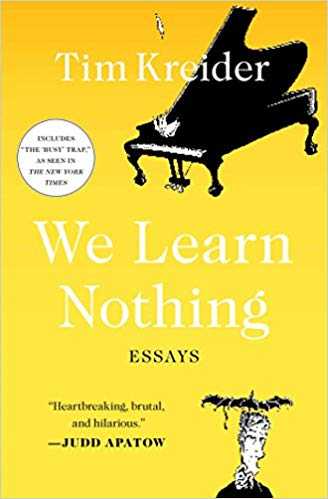We Learn Nothing: Essays and Cartoons
by: Tim Kreider
Check out the book on Amazon | your public library.
16 Highlights | 2 Notes
experience, the way some people will relate the whole narrative of a dream in a futile attempt to evoke its ambient feeling
The Soul Toupee is that thing about ourselves we are most deeply embarrassed by and like to think we have cunningly concealed from the world, but which is, in fact, pitifully obvious to everybody who knows us.
A couple of years ago I realized something kind of embarrassing: anger feels good. Although we may consciously experience it as upsetting, somatically it’s a lot like the initial rush of an opiate, a tingling warmth you feel on the insides of your elbows and wrists, in the back of your knees. Understanding that anger was a physical pleasure explained some of the perverse obstinacy with which my mind kept returning to it despite the fact that, intellectually, I knew it was pointless self-torture.
If you’re anything like me, you spend about 87 percent of your mental life winning imaginary arguments that are never actually going to take place. You makeup little stories to explain misunderstandings and conflicts, starring yourself as innocent victim and casting your antag-onist as a villain driven by sheer, unilateral, motiveless malice. If you’ve ever made the mistake of committing your half of these arguments to print or email, you probably learned, as I have, that the other person’s half of the argument fails toc onform to the script you wrote for them.
Moral philosopher Jonathan Haidt asks similar questions of his students in an exercise he calls “moral dumb-founding,” to palpate the difference between reasoned judgment and visceral reaction. Understanding the distinction between the two is useful in clarifying ethical questions; simply discounting the latter, however, will get you stoned to death in the town square.
Because the essence of creativity is fucking around; art is that which is done for the hell of it. And Ken was not a fundamentally playful person.
One of the hardest things to look at is the life we didn’t lead, the path not taken, potential left unfulfilled.
My father, Walter, was what you might call extremely high-functioning, hypercompetent, a man who always seemed to have two or three appointments scheduled at once.
for he was constantly on the go and threw off ideas the way a burning pinelog throws sparks.”
As my mother put it, “Your father had some of that same manic energy Uncle Lee did. They were both full of ideas. The difference was that your father’s ideas generally connected to reality, but Lee’s never did.”
You are literally There for them
Family is all about baggage—feuds and grudges and long-unspoken tensions, having fights and being forced to apologize, enduring each other’s unendearing foibles for decades
It is this state that rock climbers, pinball players, and libertines are all seeking: an absorption in the immediate so intense and complete that the idiot chatter of your brain shuts up for once and you temporarily
lose yourself, to your relief.
